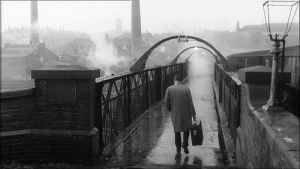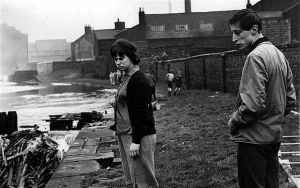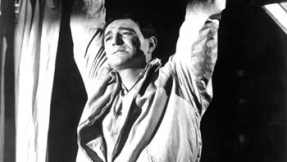Gender Expectations in British New Wave Cinema
British New Wave Cinema is abundant with working class characters feeling suppressed and sometimes tragically destroyed by gender roles. Gender connects with established social standards within working class communities. Peter Hutchings states that during British New Wave Cinema’s prominence it contains “a mature, intelligent engagement with contemporary British social life” [1]. British New Wave Cinema represents this through working class characters wanting to disengage with expected gender roles, bearing the brunt of their communities’ rigidness as a result.
Short Overview of Gender in 1960s British Working Class Communities
Gender is a social convention in which men and women are expected to fulfill specific roles. British working class men and women during the 1960s had to undertake certain activities without fail. John Hill notes in 1960s British working class communities “elemental work and elemental masculinity” [2] are intertwined. British working class men had to undertake physically demanding jobs to be providers for themselves or their family. Jane Thompson states a woman’s duties within the 1960s British working class communities is “bringing up their children, looking after their houses, servicing their men” [3]. This is a stark contrast for women, where they always serve others rather than undertake their own ambitions. British New Wave characters always contest these fixed gender roles.
A Kind of Loving (Dir. John Schlesinger 1962)

A Kind of Loving follows the life of Vic, who wants to make something more for himself than his surroundings can offer. However, when his girlfriend Ingrid becomes pregnant, Vic suffers the consequences. Before Vic meets Ingrid, he wants to escape his working class surroundings and make a name for himself. Vic feels his father’s life, working a minimum wage job with no future prospects, will soon be his own fate like it is for many men in the working class community. Takako Seino notes British New Wave Cinema always contains “anxiety about gender as much as economic disempowerment” [4]. Therefore Vic strives to become successful as he wants to be above the working class community. Vic’s sense of superiority in rejecting physically demanding work is a major behavioral flaw, making Vic unprepared for future responsibilities. This is particularly true in his relationship with Ingrid. Vic and Ingrid, in accordance to their working class communities’ expectations, marry as a result of her pregnancy. Vic begins to disrespect Ingrid because he feels too superior to be forced into marriage and live in a town with no further prospects.
“I didn’t bargain for this bloody lot!”, Vic exclaims as he becomes overwhelmed with his responsibilities. Vic chooses to ignore the role of a respectable and committed husband who provides for his wife as he is too immature. Vic admits even after Ingrid suffers a miscarriage that “I couldn’t get use to the idea of being a father anyway”. Vic’s behavior as a husband did not fulfill established gender roles within working class communities, simply because he felt superior to everyone else. Robert Murphy sees Vic’s characterisation as “almost painfully ordinary” [5] . Murphy’s quote shows the realism of Vic’s complex personality, forced into gender expectations through circumstance yet is reluctant to fulfill them. A Kind of Loving‘s ending indicates Vic and Ingrid will attempt to reestablish their marriage. If this interpretation is correct, then it suggests Vic will at least attempt the traditional male gender role as a providing husband.
A Taste of Honey (Dir. Tony Richardson 1961)

A Taste of Honey is the story of Jo, a young teenager whose struggles through poverty become worse after an unwanted pregnancy. Jo is more than willing to accept her pregnancy. However, Jo goes against gender roles within her working class community in her choice for a parental partner. Geoffrey, Jo’s close friend, is a homosexual. Homosexual activity in Britain during A Taste of Honey‘s release could result in a jail sentence, so Jo considering Geoffrey as a parental partner is controversial. Male homosexuals are a contrast to traditional male gender roles in working class communities, so Geoffrey becoming a provider for Jo and her unborn child would also be difficult for others to accept. Jo choosing Geoffrey isolates her from the working class community as she refuses to be passive and serve others’ expectations.
Jo, as a young mother, is expected to settle down with the true father and become mature. However, Jo’s quirkiness against convention makes her an outsider. Even Geoffrey understands Jo’s quirkiness in rejecting the traditional female working class role, including her instigation of their unconventional union, could be hazardous. Geoffrey tells Jo that he will stay with her till she finds “somebody to love”, meaning a heterosexual male who will be able to fully provide for her. This leads to a continuation of uneasiness between Geoffrey and Jo stemming for the reality of their situation. Geoffrey is angered by Jo’s continuing immaturity as an expecting mother while Jo, despite her enthusiasm for Geoffrey as a parental partner, sometimes feels he should be more masculine. The unconventionality of Geoffrey and Jo’s relationship ultimately fails when Jo’s mother Helen reenters her life, deciding to be the main influence in raising Jo’s unborn child. Helen’s resistance is partly due to Geoffrey as a paternal partner. Helen forces Geoffrey to move away from Jo, indicating Jo will be molded into a traditional working class mother. A Taste of Honey‘s final shot of Jo holding a sparkler is described by John Hill as “the flame of life” [6]. The sparkler represents Jo’s unconventionality, which will soon burn out and become contained by established working class gender roles.
This Sporting Life (Dir. Lindsay Anderson 1963)

This Sporting Life follows the trails and tribulations of Frank Machin, who refuses to take any form of responsibility and only cares for himself. Despite Frank working as a coalminer, a traditional employment choice for males in working class communities, he prefers playing for the local rugby club. Frank is miserable unless he is on the playing field, where he could express his immature and brutish behavior. “No need to take it serious, it’s only a game old sport” Frank is told. This underlines Frank’s immaturity towards actual requirements in working class communities, he is reluctant to continue in a demanding job or be a true provider for anyone but himself. Mark Donnelly sees Frank as a character who “sought through self-centered, instant gratification” [7] rather than simply fulfilling his gender role as a working class male.
Frank’s behavior affects his relationship with Margaret, the woman whose house Frank lodges in, due to his rejection of accepted values in his working class community. Frank constantly comes onto Margaret, wanting to be her boyfriend. Margaret feels she should serve her children first as expected by a mother. Margaret detests Frank’s personality by describing him as “a great ape on the football field”. Frank deludes himself by reading pulp fiction books, emphasising his lack of maturity instead of contemplating criticism. Once Frank becomes a successful rugby player, his immaturity grows and he begins to buy extravagant gifts for Margaret’s love. Frank hates his working-class background because he is expected to be a provider through hard work, so he feels a lavish lifestyle is an escape. However, it has the opposite effect where everyone sees Frank as an immature adult and quick riches are not a solution to his problems. Although Margaret does contemplate a relationship with Frank, she is self-conscious about what her neighbors might think. Margaret’s understanding of her role in a working class community means she cools down her feelings, understanding she has to be a mother first. When tragedy strikes in Margaret’s death, Frank can not accept it or is willing to solve the future of Margaret’s children. Therefore Frank immerses himself into rugby, shown in This Sporting Life’s final scene. Frank can never fit into the traditional male gender role in the working class community, proving Margaret’s previous doubts regarding Frank as a provider.
British New Wave characters in attempting to overcome gender roles always suffer defeat. Gender is a part of established social standards within working class communities. In 1960s Britain this is an unchallengeable fact within working class communities. Any resistance to this shown by British New Wave characters is immediately shown to be hazardous. No matter how right or wrong British New Wave characters are in controlling their gender roles, their working class communities’ shock and disgust plays a part in each character’s tragic decline, wherever it ultimately means conforming or continuing to suffer. The reality of defying gender means collapsing under traditionalism. British New Wave Cinema exposes the rigid 1960s social structure, making its films a valid part of the changing culture climate occurring in the decade.
Works Cited
1. Hutchings., P. 2006. ‘Beyond the New Wave: Realism in British Cinema, 1959-63’. Robert Murphy, ed., The British Cinema Book, 2nd edition, London, BFI Publishing. 2002. pp.146-152.
2. Hill., J. 1986. Sex, Class and Realism: British Cinema 1956-1963. BFI Publishing.
3. Thompson., J. 2002. Women, Class And Education. Routledge.
4. Seino., T. 2010. Realism and Representations of the Working Class in Contemporary British Cinema. [Online]
5. Murphy., R. 1992. Sixties British Cinema (The History of British Cinema). British Film Institute.
6. See Number 2.
7. Donnelly., M. 2005. Sixties Britain: Culture, Society and Politics. Taylor & Francis.
What do you think? Leave a comment.











Where are the British classics like these now!
I watched this A Taste of Honey today as I saw a brief clip and I instantly wanted to see it. I love northern Drama/Plays. My grandparents were all born and bread in Yorkshire and from what I’m told had very strong accents.
It was a brilliant play or rather film. I did however sink when the film ended when it did. It leaves the viewer asking questions and I felt really sorry for Geoff. I found this a very funny (in places) drama aswell as quite sad.
A Taste of Honey, like the other films mentioned, certainly raise questions for audiences regarding the society each film represents
I own very few movies – this is one of them. I’ve seen it many times and am always moved.
A Kind of Loving. I first saw it late one night writing my master’s thesis, too many years ago, and thus fell in love with 1) Alan Bates, and 2) English films from the 60’s….particularly the “kitchen sink”/”Angry Young Man” genre, as this one is.
I accidentally bought the DVD in European format. I have YET to find this glorious gem in an American-formatted DVD. Does anyone know if Amazon has it available yet? I haven’t found it.
A Kind of Loving is an excellent piece to explore. Class, politics, working life, changing attitudes about gender and marriage, and even scarcity of cheap housing are all referred to or explored.
My favourite scene is the railway station where Vic hits rock bottom.
There are many films in this genre when British cinema turned its back on elegance or heroism but none has captured the mood of resentment better than “This Sporting Life”.
Something was happening in the British cinema in the 60s. Where did it all disappear?
Cool article. I’m a fan of all British cinema so I’ll have to check these movies out!
Thank you
I have a real soft spot for This Sporting Life and I’m sorry that I have concentrated on my memories rather than the films content.
I saw A Taste of Honey when it first came out. I was a kid and very impressionable. I haven’t seen it since but find I’d forgotten little.
But I love This Sporting Life!
There were several aspects about this film that I find absolutely clever.
Great Article. I saw A Taste of Honey in my film studies class, but he only focused on the evolving nature of foreign cinematography. I need to check out those other movies now
A Taste of Honey is such a timeless and thought-provoking film, a classic of it’s kind that holds up superbly more than 50 years on.
Very nice article! In all my film classes I don’t think we ever discussed British New Wave. I’ll check these out.
Thank you. British New Wave is not dissimilar to Italian Neo-Realism both aesthetically and in narrative themes, just to give you a comparison.
I find Frank very interesting. Here is a man whose eschewing of work could be construed as a rejection of his prescribed gender role, but whose flights of sporting fancy are read–simultaneously–as childish and animalistic. Is he, then, rejecting “normal” masculinity, or diving into it headfirst?
I wouldn’t say Frank’s love for Rugby meant he loved an aspect of masculinity. The notion of masculinity within working-class communities is to be strong primarily for others. Frank is too selfish for that, hence why I argued he rejects gender expectations.
Great to see an article about this genre. These films are important archives of British social history. They have a rawness and honesty that I find sadly missing in portrayals of the social classes now. Have we become too politically correct or is it that there are limited opportunities for non-university educated screenwriters? What will 21st century films leave behind to educate future generations of what life in Britain was really like? For anyone who loves these films try “Georgie Girl”, “Up the Junction” and “The Family Way”.
Made me think and examine the recent Andrea Arnold films “Fish Tank” and “Red Road.” In particular, “Fish Tank” deals with a female character at odds––in some ways––with her gender. She is a tomboy, but also learning about and exploring her sexuality… I won’t give it away: But an older male character presents an interesting foil for the protagonist. Anyway, this is a newer film and a different thing, but it’s worth watching––it’s truly amazing.
Aside from the discussion, the film also raise psychological questions of full personal development.